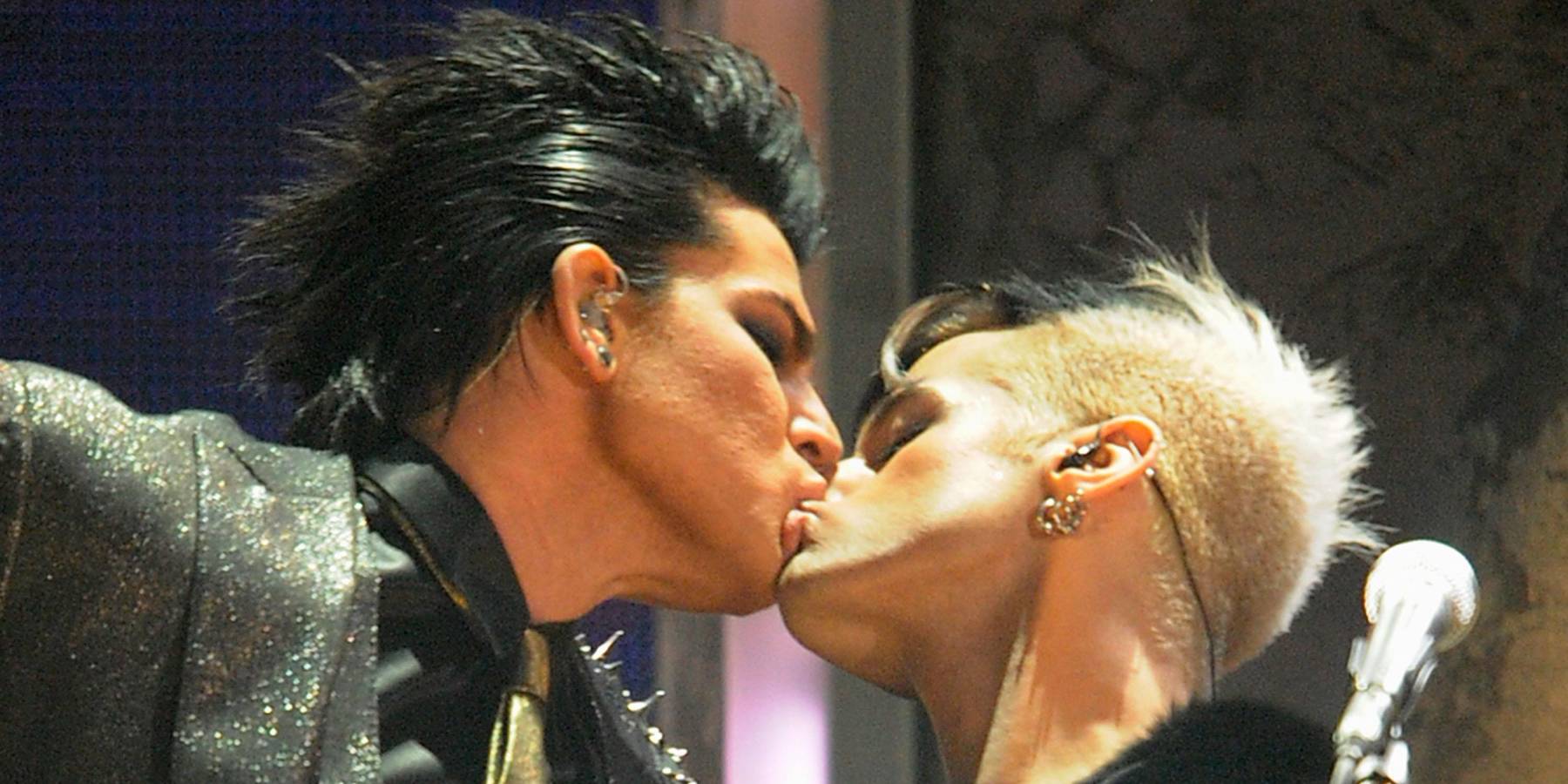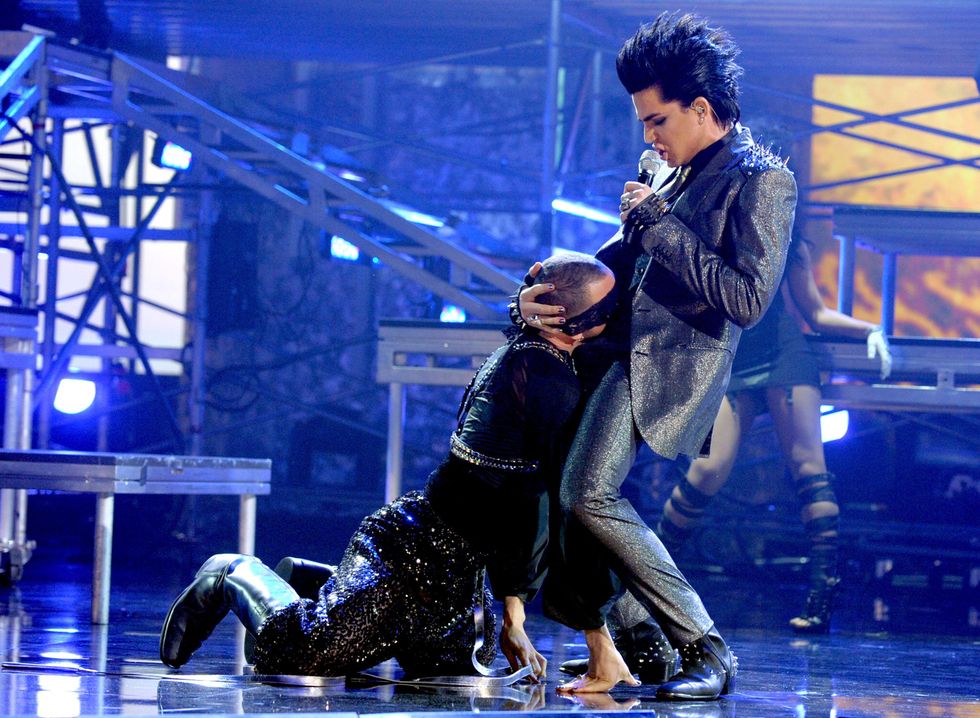
I've moved far past the need for my queer identity to be validated by mainstream representation, but I'd also be lying if I said that I didn't tear up a little when I watched Lil Nas X's "MONTERO (Call Me By Your Name)" music video for the first time. Part of the reason why the "representation" conversation wears me out so thoroughly is because people, for the most part, are only concerned with "good" representation — good meaning family-friendly, likable, and certainly never ever sexual. Never mind the fact that sometimes, stereotypes are based in truth, and queer people in real life are often not very "family friendly," depending on what your definition of family is.
But here was the biggest male pop star in the world, defying the puritanical sensibilities that seem to characterize much of his extremely online queer Gen Z peers — bringing an "all-male leather orgy," as Jazmine Hughes put it, to his Saturday Night Live debut, passionately making out with a backup dancer while clad in a gold miniskirt at the BET Awards. Here was Lil Nas X, breaking the "love is love" era taboo that has mandated the sanitization of public queerness. In the "MONTERO" video, he elevates and defiles the aesthetics of antiquity that white right-wingers favor so heavily, taking the place of Eve in the garden, seduced by none other than a reptilian version of himself. And of course, there's the penultimate moment in which he gyrates down a pole to hell to literally dance with the devil and take his place.
Related | Lil Nas X Knows You've Been Naughty
Even when hearing the song's radio-friendly version, it never fails to tickle me that censors can force the rapper to swap "champagne" for "cocaine" and say that he wants to "put a smile" on his lover's mouth while he's riding. No amount of censorship can hide that this is a deeply horny, gay song.
It's taken a while to get here. Especially when you recall the very different reception that Adam Lambert received for his overt displays of raunchy, queer sexuality at the American Music Awards in 2009. Whereas Lil Nas X's career has remained relatively unscathed by his performances, Lambert was nearly ruined. In a recent interview with Billboard, Lambert discussed how his performance of his song, "For Your Entertainment," immediately led to future television performances of his getting cancelled, which led to him having to "toe the line a bit" for the sake of preserving his career. Blessedly, he's never apologized.

The Billboard article reduces the controversy surrounding both Lil Nas X and Adam Lambert's performances to the presence of a same-sex kiss. But if the artists had simply engaged in chaste embraces, the backlash wouldn't have been so severe. The real controversy is that they both gave audiences, in their own ways, a look into blatantly kinky, queer fantasies. The desires that we're often made to lock away and to banish, as Lil Nas X puts it, were brought into plain view in front of millions of viewers. If they can dare to flaunt these desires on stage, they seem to be saying to the audience, you can too.
That's the role Lambert's 2009 performance played for me, anyway. If you haven't seen it, allow me the pleasure of setting the scene for you. It's the year after Proposition 8, the ordinance that banned gay marriage in California, was passed. Adam Lambert takes the AMAs stage, sparsely lit and otherwise shrouded in darkness.
"Can we pick up the pace?" he sings, accompanied only by a piano. "Turn it up, heat it up, you need to be entertained." It's worth noting that in the studio recording of "For Your Entertainment," he says, "I need to be entertained."
Then, the set roars to life to the tune of a pulsing electronic beat. Dancers of all genders clad in leather pants and harnesses and garters drape themselves on mostly unadorned stage risers, which adds to the grit.
"Push the limit, are you with it baby, don't be afraid," he drawls as he drags a woman by the ankles across the stage, only to immediately pivot to walking two male dancers back across the stage on a dual leash.
In another moment of censors proving hopelessly inadequate in the face of horny gay shit, he then grinds his crotch into a male dancer's face while the audio goes silent. But that doesn't change the fact that millions of viewers, 11-year-old me included, saw it happen. And were able to revisit it on YouTube later.
"Oh! Do you know what you got into?" he asks the audience. "Can you handle what I'm 'bout to do?" The answer, as it became immediately clear, was no, but he turns a literal mirror on the audience anyway. These fantasies exist within you too, he seems to be saying, and I will be the one to bring them to light.
Related | Lil Nas X on a Unicorn Floatie
Then, during the final chorus and right after the final repetition of "Can you handle what I'm 'bout to do?" he immediately grabs his male keyboard player and makes out with him with a fervor.
After that, something in me was changed forever. Truth be told, I was actively homophobic as a kid. Prop 8 was my first introduction to the concept of gay people, and as a Catholic kid with all Mormon best friends, I just accepted at face value that being gay was inherently sinful, and therefore undesirable.
But Lambert's performance awakened something in me. Though the performance is obviously just that — a performance — he was one of the first visual demonstrations I had of what gay sexuality could look like. 12 years later, it's still one of the most subversive performances I've ever seen on an awards show stage. And I don't think it's a coincidence that I came to terms with the fact that I wasn't straight a year later.
That's why I find the current strain of gay sexual conservatism among my fellow Gen Z'ers so alienating. Even among LGBTQ+ circles, it's become a somewhat popular assertion that all displays of public sexuality are inherently harmful to children, or that they're secretly rooted in pedophilia — take the never-ending "kink at Pride" discourse, for example, which asserts that public displays of alternative sexuality are somehow harmful to minors who might be attending pride celebrations. (Never mind the fact that Pride wouldn't be Pride without the activism of leather communities.) Aside from those notions being grounded in literal right-wing homophobic talking points, they also fail to take into account experiences like mine, which I know are not uncommon. What was actually damaging was the gratuitous heterosexuality that had been shoved down my throat my whole life — the Abercrombie bags, the Victoria's Secret ads, the suburban parents I met who seemed to all hate each other viciously but stayed together inexplicably.
Lambert showed me an escape from that dull fate, one that excited me far more than any of the possibilities I'd been presented with thus far. It didn't hurt me to see him unabashedly owning his eroticism on stage — it liberated me. Just as Lambert was for me, I know Lil Nas X has undoubtedly already served as that same awakening for countless young people. Now that the culture seems, at long last, to have caught up, I can't wait to see what he does next. As long as he keeps making unapologetic gay bangers, I'll be stanning for life.
Editors note: The headline of this personal essay has been updated to better reflect the writer's original intent.
Photos via Getty